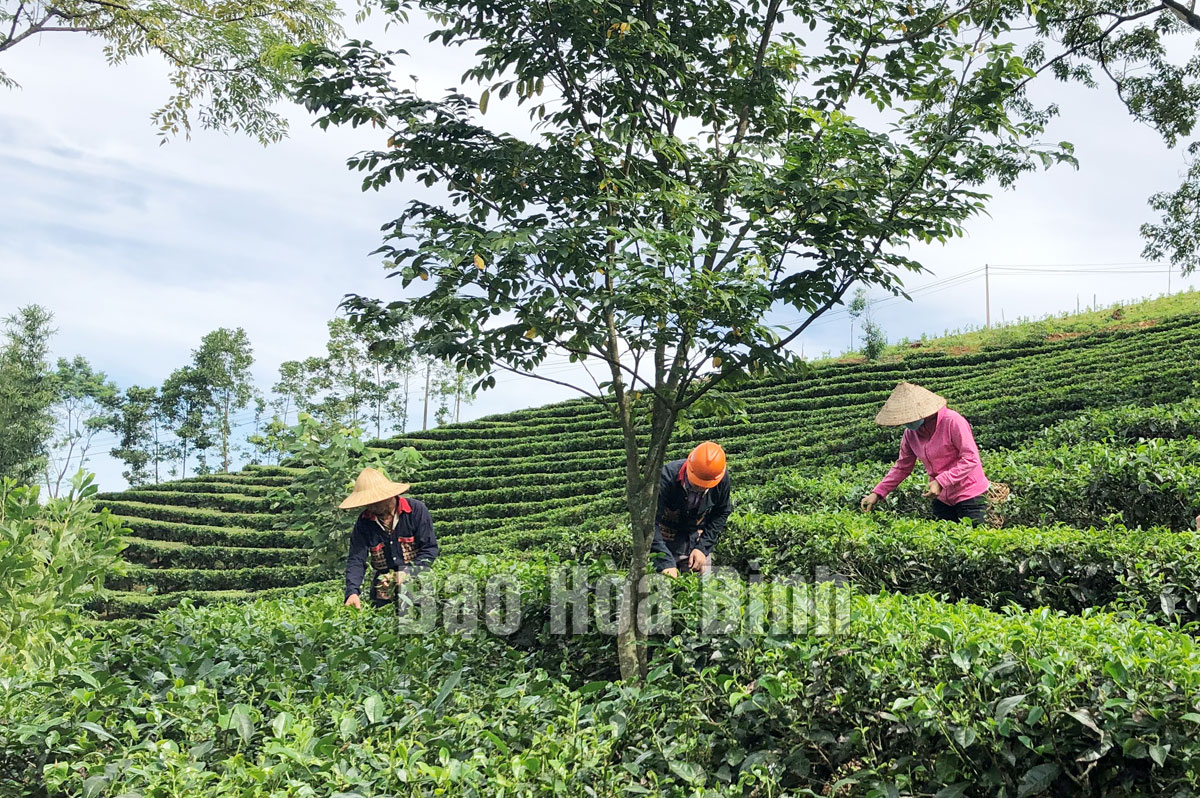
(HBO) - In recent years, the Party Committee and authorities of Hung Son commune (Kim Boi district) have combined resources of State-funded and local programmes for poverty reduction in poorest hamlets. As a result, the living conditions in those areas have been gradually improved, the average income of locals has increased to over 21 million VND/year while the poverty rate has decreased by 8-10 percent/year.

Some households in Ba Ra village, Hung Son commune
(Kim Boi) increase their income by growing tea.
The commune has five poorest hamlets which are Mat,
Bau Cau, Ba Ra, Chi Ngoai, and Suoi Kho. Those five hamlets account for 40
percent of the whole commune's population. In order to create a driving force
for economic development and create momentum for poverty reduction in those
disadvantaged hamlets, the Party Committee and administration of the commune
have mobilised resources to invest in the development of rural transport
infrastructure. Most roads to the five hamlets have been upgraded, facilitating
transport, with only the road from Bau Cau village to Ba Ra still under
construction, with a total investment of 13 billion VND.
Residents in these areas mainly rely on agriculture,
animal husbandry and afforestation for living. The local authorities have
combined policies on supporting ethnic minority areas, the district's poverty
reduction projects and preferential credit programmes to develop local production.
In addition, annually, the commune's Community Learning Center cooperates with
the provincial Center for Vocational Training and Support to open vocational
training classes to provide farmers with knowledge on growing citrus fruit
trees and tea. Many poor and near-poor households also receive support in the
form of fertilizers and seedlings.
According to local authority, Suoi Kho hamlet is the
poorest hamlet in the commune at present, with a household poverty rate of 1.27
percent. Thanks to the support in loans and seedlings, many households have
escaped poverty.
Nguyen Khac Thanh, Chairman of the communal People's
Committee said in the coming time the communal Party Committee and
administration will raise the awareness of local people on self reliance, and
provide training courses for local people on application of science and
technology in farming. The commune aims to provide local farmers with
high-yield, high-quality plant and animal varieties that are suitable for each
area's climatic and soil conditions./.
The Department of Education and Training of Hoa Binh province held a conference on March 18 to review the performance of the "Safe and Happy School" Project and set out tasks for 2025. The project, funded by the Taiwan Fund for Children and Families (TFCF), aims to create a safe, inclusive, and supportive learning environment for students. The event saw the attendance of representatives from the TFCF and 26 beneficiary schools.
With over 70% of their workers being women, trade unions across industrial parks (IPs) in Hoa Binh have been actively safeguarding their legal rights and interests while implementing initiatives to improve their income and well-being.
In recent years, the Hoa Binh provincial General Hospital has continuously innovated itself and improved the quality of medical services to meet the increasing needs of local people. With substantial investments in infrastructure and modern equipment, along with a team of highly qualified doctors and nurses, the hospital has gradually established itself as one of the leading medical units in the Northwestern region and a trusted destination for healthcare for people inside and outside the province.
From mastering the fundamentals of programming to achieving national recognition, the Programming Club of the Le Van Tam Primary School (STAR LVT28) in Hoa Binh city has made remarkable strides in the field of robotics.
The Ho Chi Minh Communist Youth Union Committee and the Vietnam Youth Federation chapter of Hoa Binh province organised a programme on March 12 to launch the "Digital Literacy" movement and an online quiz on the resolutions of the Vietnam Youth Federation congresses at all levels, as well as the Politburo's Resolution No. 57-NQ/TW on breakthroughs in the development of science, technology, innovation, and national digital transformation.
As climate change grows more unpredictable, the development of production forests has become essential - not just for economic growth, but for safeguarding the environment and maintaining ecosystem balance. By boosting local incomes, curbing natural disasters, preventing soil erosion, and protecting water resources, these forests play a crucial role in sustainable development.



